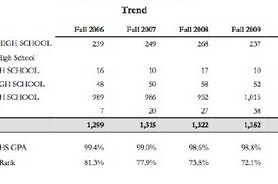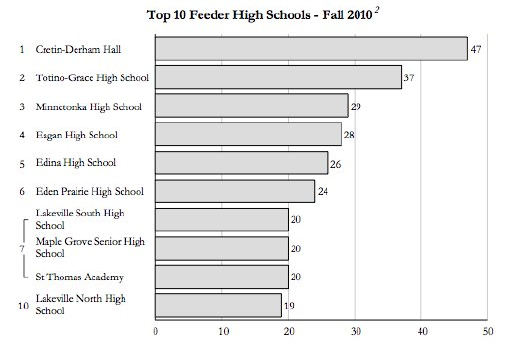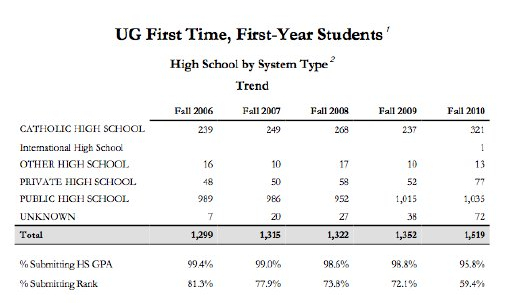Every student has to fit three required theology courses somewhere in his or her undergraduate education at St. Thomas. Coming from a public high school, I did not have the opportunity to take a religious course or mix religion with school at all. I was excited to take my first required religion course, but for others it was not their first time going through the material.
If I take an introductory theology class, shouldn’t I be with other students who are on the same level of religious knowledge? There should be a theology placement test to place students into the appropriate level of theology courses.
According to the St. Thomas Undergraduate Cohort Report, this fall roughly 400 of about 1,500 first-year students came from a private religious high school. A little less than one third of first-year students are about to learn theology material in college they’ve already learned in the last four years of high school.
The report showed the top two high schools students came from this fall were Cretin-Derham Hall and Totino-Grace High School. It also showed private high school student enrollment at St. Thomas continues increasing, meaning more students are attending St. Thomas with prior religious course experience.
I learned in my freshman year theology course that some students were far more educated and comfortable taking a religion course than I was. While I stressed and studied new material for the quiz, exam, mid-term or final, other students didn’t have to open the Bible or textbook.
I felt behind on material in comparison to seminary students, former private high school students and students who were more “Catholic-knowledgeable.” Other students didn’t have to study for the course and could submit a high school paper or speak about common religious topics that were drilled into their minds in high school.
This circumstance is equivalent to a 300-level Spanish student who has to learn basic numbers and the alphabet in a 100-level course. The student is not challenged.
The St. Thomas theology department webpage says the theology 101 course “provides students with a basic level of theological literacy to prepare them for the second- and third-level courses.” A seminary student or former private high school student is not going to want to re-learn “basic” knowledge.
Seminary students are those who should be placed in a higher level. They are great assets to theology classrooms and have contributed valuable, philosophical insights in all my courses so far. However, it does not seem logical that I have to learn the material fresh, and they get to review their abundance of knowledge about the topic to earn a top grade.
They should have a chance to reach their potential by being placed into a course that challenges their knowledge and not have to review the Adam and Eve story again.
St. Thomas students are required to take at least three language courses and are required to take a language placement test. If a student tests out, that student does not have to take a language course, meaning their previous years studying a language paid off. It should be the same for theology courses.
Former private high school students probably don’t want to waste at least $9,000 and three more class periods studying a subject they’ve been learning for years. A 300-level student isn’t interested in learning about basic Genesis stories.
I understand St. Thomas is Catholic-based and realize religion courses are required. That was a primary reason I chose to enroll here. I’m not trying to say ‘Get rid of the theology requirement’ or even place out of the three courses, but rather to place students into the appropriate courses to fit their level of knowledge.
First-time students should take a religious course with other first-time students. Students who already have religious knowledge should be placed into an appropriate level so they can be challenged. A theology placement test would be the perfect solution for students to reach their religious education potential.
Hannah Anderson can be reached at ande5385@stthomas.edu.




Hey, that’s a pretty good idea!
I don’t think this should work the same way the foreign language requirement does. Students should still be required to take twelve credits of theology. It’s an essential part of the school’s character as a Catholic liberal arts school. The fact that some students will have already started with some knowledge of THEO should be a springboard into still more advanced knowledge, not an opportunity to avoid learning any theology while they’re at college.
Of course, I feel the same way about foreign language courses. If you come to college already knowing the basics of a foreign language, great! Pick up a minor in it — or learn a new one!
Anyhow, Ms. Anderson, as a St. Thomas Academy grad, I was one of those people on the opposite end of the spectrum from you. And, you’re right: much as I enjoyed THEO101 (I had a great professor), I had to do VERY little learning to get an A, whereas people who were in their first religion class had work unfairly hard. Simply because of the experience I’d had in high school, the time could have been better spent in a higher-level course, and some others in the class would have gotten more out of it if I and those like me weren’t in there.
Keep the credit requirements, but bring on…
…the placement test!
Placement tests don’t just apply to foreign languages and theology, all departments should make placement tests available for students.
We might advocate for various tracks of the 101 course, but not for the advancement of more proficient students to higher level offerings. In our experience, said students often have difficulties viewing theology as an academic discipline. While many are enthusiastic and sincere in their beliefs, they arrive with many holes in their knowledge of the Christian tradition from biblical, historical, systematic and moral vantage points. In terms of learning outcomes, students who believe that they are knowledgeable in the field often perform poorly due to a lack of attention to the latter part of an oft-used definition of theology: “faith seeking understanding.” The theology department designed the 101 course to ensure that all UST students benefit from a critical, academic examination of a common set of primary sources significant to the tradition.
I never studied theology as a high schooler, but didn’t have any particular problems with any of my theology classes and never felt like I was behind…raised Catholic I did already have some background information.
I would however perhaps advocate for different tracks of Theo 101–perhaps some for the seminarians and Catholic studies majors/minors, and one for those taking it solely to fulfill requirements. In fact, I would likely have jumped at the chance to take a more challenging 101 course, although mine was still amazing (thanks Dr. Schuler!)
Susan and friend,
Isn’t the purpose of having the proficiency test to make sure they will not “perform poorly”? Further more, all students “holes in their knowledge”, even those who take the prerequisite classes. Unless of course you require everyone to get an A in their 101 class to proceed. The only risk of having a placement test is offending those who do not pass. Oh… and the University would probably lose some money if we didn’t go Jame’s route. So, two risks.
Third risk: the Theology department’s carefully crafted textbook, “The Christian Theological Tradition,” would go unread by 25% – 50% of entering students. I think that would sting the THEO department, which has collectively put in thousands of hours or more making that book the best it can be.
Thing is — for me, at least — while I thought it was a pretty decent textbook, I was reading it as a critic, not a student… because I already knew nearly everything in it. There was certainly nothing essential about it as a foundation for future classes.
Ms. Meyers and Ms. Spenser are right that there are quite a few students who come in thinking they know everything turn out to be fairly ill-equipped for academic theology, because they know “the rules” of the Magisterium but don’t know the history or how critically examine it. As a result, “they arrive with many holes in their knowledge of the Christian tradition from biblical, historical, systematic and moral vantage points.” Yet I don’t see why that’s an obstacle. We can TEST for historical, systematic, and moral vantage points in a placement test. Especially if there’s an essay component.
I still like this plan, and I genuinely think the THEO faculty would, too, if they gave it a go.
.
Dr. Myers and Prof. Spencer.
Ooo. I didn’t know they were faculty. My bad.